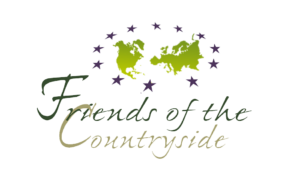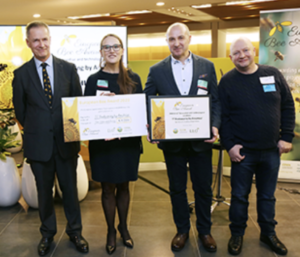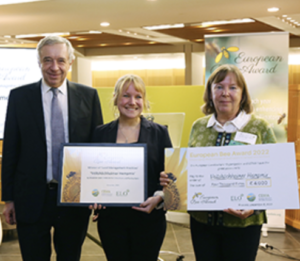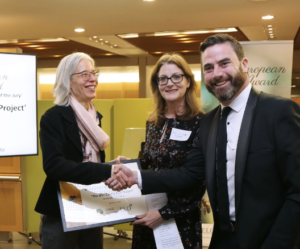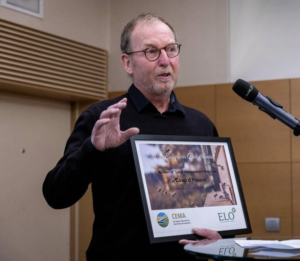
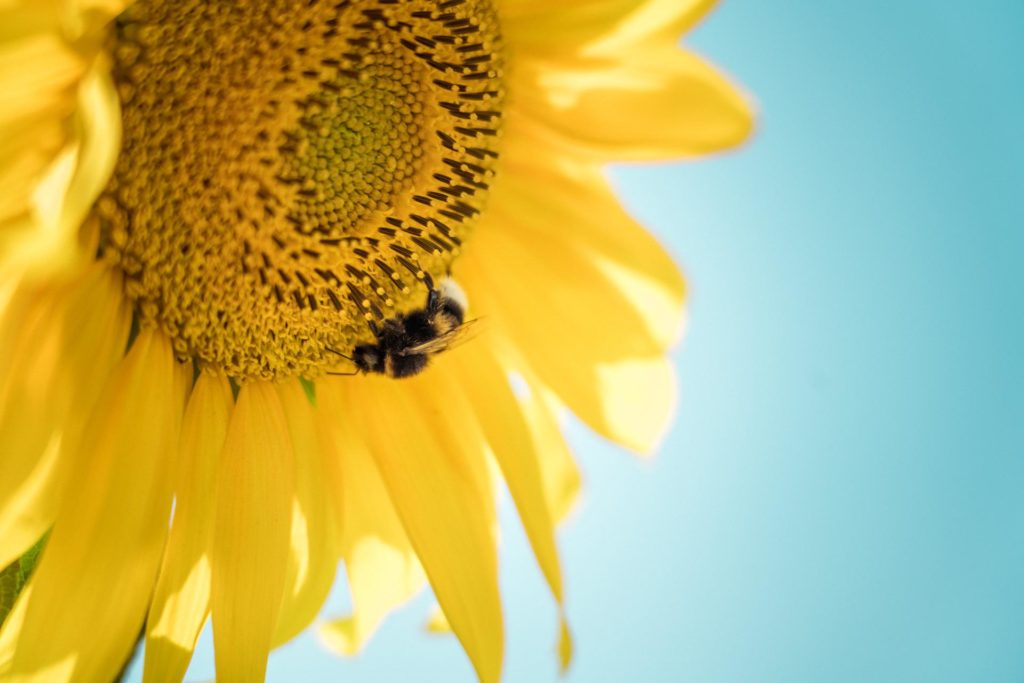
Are you part of an innovative project protecting bees or other pollinators?
The European Bee Award is launching the call for applications for 2022! The European Landowners’ Organization (ELO) and the European Agricultural Machinery Industry Association (CEMA) invite you to submit your project by September 2023.
Since 2014, the Bee Award is committed to find common solutions for the benefit of biodiversity by rewarding projects protecting pollinators.
3 prizes will be awarded:
*Land management practices (4,000€ prize)*
*Innovative Technological Solutions (4,000€ prize)*
*Special Mention of the July (Diploma of Recognition)*
Who can apply?
The European Bee Award is open to everyone*.
We reward farmers, landowners, research institutes, academia, and private and public organisations who develop outstanding and innovative projects aiming to protect bees or other pollinators and helping to preserve biodiversity.
Former applicants are very welcome to re-apply! Check the terms and conditions in the application form
How to apply?
Download the Application Form and send it by email to [email protected]
European Bee Award 2022: And the winners are…
In an award ceremony hosted by MEP Franc Bogovič at the European Parliament in Brussels, the IX edition of the European Bee Award rewarded a wildflower mixture for biogas production and a beehive monitoring system. Brussels 7th December 2022 – The European Bee Award has been acknowledging innovative, efficient, and scalable projects that protect pollinators in Europe since it was established in 2014 by the European Landowners’ Organization (ELO) and the European Agricultural Machinery Industry Association (CEMA). The ELO and CEMA were delighted to award this year’s prizes last night to the winners:
Winners of Land Management Practices
Category ‘Land management practices’: the winner is Veitshöchheimer Hempmix (‘Veitshöchheimer Hanfmix’) by the Bavarian State Institute for Viticulture and Horticulture (LWG). LWG designed a wildflower mixture of 30 predominantly native wild and cultivated annual, biennial and perennial flowering plants that deliver diverse floral resources, as well as biomass that can be used for the production of biogas. This creates an agricultural cultivation system that combines productivity and biodiversity.
Winners of “Innovative and technological solutions”
Category ‘Innovative and technological solutions’: the winner is IT Beekeeping by AmoHive. Amohive created a small 3D model of a hive that monitors hive activity (through an electronic scale, temperature sensors, GPS and a solar panel that powers the electronics) and sends information to a server. An algorithm processes the data and decides in which mode the hives should continue to work. The data can be followed in real time in an app which is already used in Poland, Ukraine and Canada.
Winners of the Special Mention of the Jury
The Special Mention of the Jury was awarded to Birr Castle Bee Project by the Birr Castle Estate, who implemented changes in the land and forest management across the estate’s 900 hectares in order to create, protect, and enhance bee habitat wherever possible.
European Bee Award 2021: And the winners are…
Winners of Land Management Practices
Category ‘Land management practices’: the winner is ‘Coup d’Pousse’, a project by Réseau Biodiversité pour les Abeilles. With the participatory action of melliferous fields sponsorship, farmers can register to benefit from seeds to sow flower strips in fallow land in spring, and intercrops in summer. Beekeepers can also register to get in touch with farmers who implanted floral resources in their department, to set up their hives there.
Winners of “Innovative and technological solutions”
Category ‘Innovative and technological solutions’: the winner is ‘Connected scales’, an initiative by FDSEA Ilede-France (Departmental Federation of Farmers Unions in the region Ile-de-France). This project aims to allow the best living conditions for bees by protecting them from phytosanitary treatments periods. Besides agricultural practices adaptation to bee protection, this project also implements flowering fallows to make them available to pollinators.
Winners of the Special Mention of the Jury
The ‘Special Mention of the Jury’ was bestowed to ‘Smartomizer H3O protecting bees by reducing the pesticides use’, by Pulverizadores Fede. The Smartomizer H3O is an integrated pest management system that reduces negative effects on pollinators and also protects biodiversity by reducing the environmental impact of the high value crops protection task by carrying out precise and eco-responsible treatments.
For more details, please check the press release
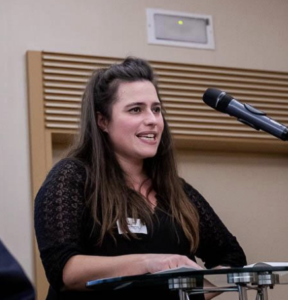
Connected scales’, by FDSEA Ile-de-France receives the Innovative and technological solutions prize.
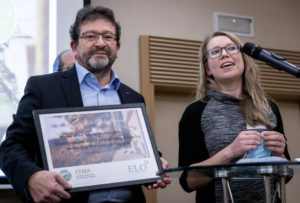
Pulverizadores Fede receives the Special Mention of the Jury for their ‘Smartomizer H3O protecting bees by reducing the pesticides use’.
European Bee Award 2020: And the winners are…
An online award ceremony, hosted yesterday by MEP Franc Bogovič, the VII edition of the European Bee Award recognized the work and commitment put in place though innovative ideas and practices to protect bees and pollinators in European farmed landscapes.
For years, the European Bee Award has been promoting bees and pollinators’ wellbeing, essential to preserve and restore biodiversity in farming environments in Europe. The prize was established by the European Landowners’ Organization (ELO) and the European Agricultural Machinery Industry Association (CEMA) in 2014 as a way to acknowledge innovative, efficient and scalable projects that protect bees and pollinators in Europe. This year the traditional awarding ceremony took place online. The winners of the 2020 European bee Award are.
Winners of Land Management Practices
Let it Bee by The National Federation of Group Water Schemes, Roscommon County Council and Roscommon Group Water Schemes.
‘Let it Bee’ puts in place a comprehensive project to promote sustainable farming practices that lead to improved water quality at sources, increased biodiversity, and enhancement of climate awareness. The project includes a pilot programme providing farmers with honey bees, hives, suits, necessary equipment and training & mentoring, and encouraging them to act as ambassadors for biodiversity enhancement.
Winners of “Innovative and technological solutions”
StopVespa by Università degli Studi di Torino
The Life StopVespa project developed an innovative harmonic radar technology for tracking flying hornets of the Asian yellow-legged hornet (Vespa velutina), an invasive species that threatens honeybees and wild pollinators of Europe.
Winners of the Special Mention of the Jury
Bybi by The Copenhagen City Bee Association
The ‘Copenhagen City Bee Association (Bybi)’ was awarded the Jury Special mention prize for their impressive work of promotion of apiaries and honey making in a urban collaborative environment.
The ELO and CEMA would like to congratulate all winners and all contenders for this year’s European Bee Award, and thank them wholeheartedly for their work and their highly valued contribution to the biodiversity and pollinators.
Please find below all the projects who wanted to be featured on our website
Winners of 2019 European Bee Award
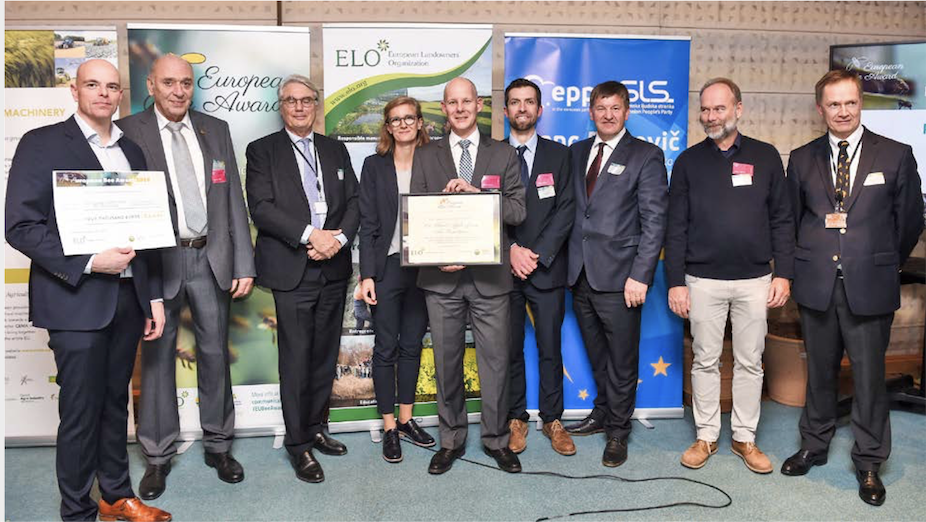
Bees and other pollinating insects make a critical contribution to crop production and pollination of wild plants. Yet there is concern about declines in these important species across Europe and elsewhere. With sponsorship from CEMA, the European Landowners’ Organisation announces the “European Bee Award”, a prize for new interventions that promote the protection of pollinators in the farm environment.
Brussels, 10th of December 2019
in a ceremony hosted by MEP Franc BOGOVIČ at the European Parliament in Brussels, the 6th edition of the European Bee Award once again acknowledged the great commitment of private and public organizations, as well as the involvement of the research community, to enhance pollinators’ wellbeing and support bee-friendly farming practices in Europe.
With the aim of acknowledging innovative, efficient and scalable projects that protect pollinators in Europe, the European Bee Award, established by the European Landowners’ Organization (ELO) and the European Agricultural Machinery Industry Association (CEMA), was awarded to the following winners:
Category 1: Land Management Practices: ‘Pro Planet apples’ from the Lake Constance Foundation
Category 2: Application of innovative technological solutions: Bee Varoa Scanner from Turin
Patrick TRÖTSCHLER presented the project ‘Pro Planet apples’ from the Lake Constance Foundation. They set out to motivate as many farmers as possible to enhance the food and habitat situation for pollinating insects in and around lake Constance’s orchards whilst developing, testing and implementing measures to improve the volume of nectar and pollen plants. The project has seen positive results with the concept being transferred to other apple producing regions in Germany and Austria.
Davide BASSIGNANA presented the Bee Varroa scanner. The Varroa parasite is the main cause for the decline in the health of the honeybee. Apisfero set out to create a technology which would counter the threat of these deadly mites.
Michael GARRATT, the Chair of the Jury, gave a special mention to ‘Green-roofed bus shelters in Utrecht’ for their innovative and original way of providing shelter and feed for pollinators in urban areas where their natural habitats are scarce.
Franc BOGOVIČ MEP and host of the ceremony stressed “The European Bee Award” is a necessary recognition to the very valuable projects which year-on-year show there is a shared commitment to protecting pollinators in European agriculture. It fills me with joy to see the number of applications to the Bee Award competition rising from year to year. This year there were 36 applications all together, which shows that the European Bee Award is indeed gaining its importance and is also a generator of new ideas, which promote solutions that improve the state of the biodiversity in EU.”
Alain SCRIBAN, special adviser for ELO said “For land managers, pollinators are our friends in the field. Without thousands of bees, butterflies and other insects, our crops would not grow and flourish. Together with farmers, they are among the hardest workers in the countryside, and they all deserve our support.”
Gilles DRYANCOUR, Chairman of the CEMA Strategic Committee and member of the Bee Award Jury, pointed out “initiatives such as the European Bee Award are showcasing bees and pollinators as an essential part to enhance more sustainable farming practices in Europe. Indeed, there is a strong willingness from the European agricultural equipment industry to support innovative projects which could be scaled up for protecting bees’ and pollinators’ life.”
In 2019, the European Bee Award competition received 36 applications from 11 different European countries. The prize ceremony gathered over 100 participants: bee-keepers, policy makers, land managers, academia and representatives of the agri-food sector exchanged best practices, while getting inspired by new ideas on how to protect bees and enhance biodiversity in Europe.
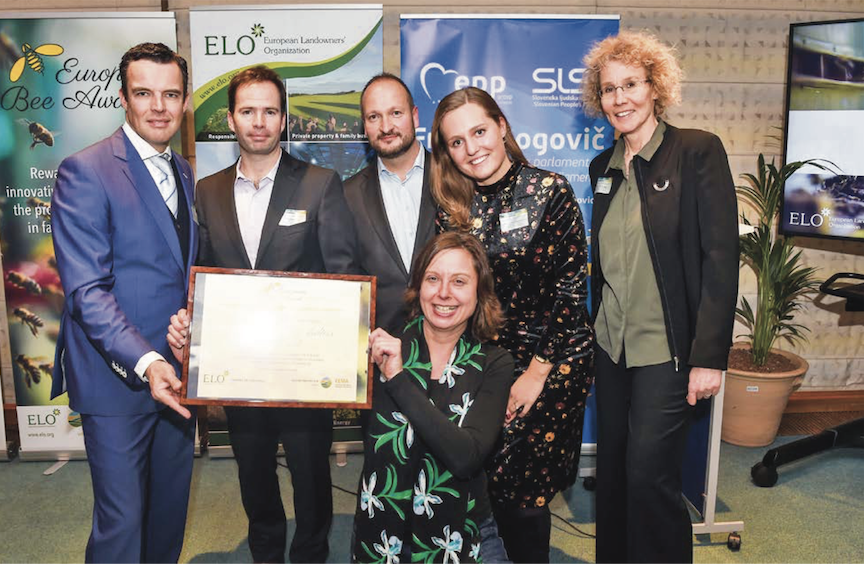
Special Mention : Green-roofed Bus Shelters in Utrecht
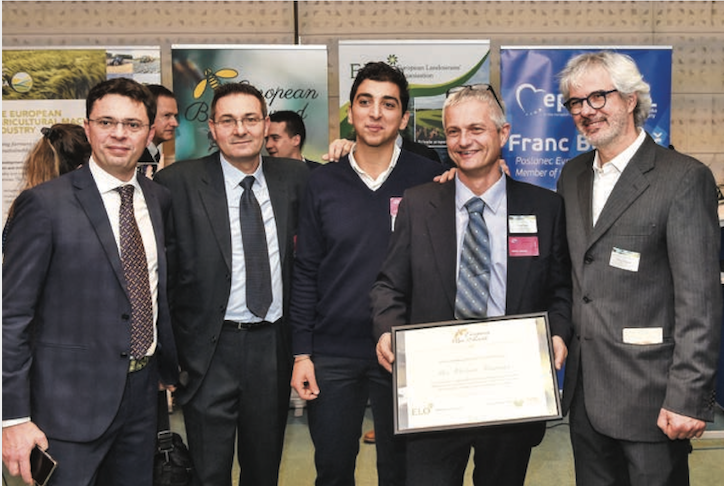
Category 2: Bee Varoa Scanner from Turin
2018 EDITION
MEP Karl-Heinz Florenz hosted the ceremony at the European Parliament in Brussels and in the presence of EU Director General for Environment Daniel Calleja Crespo, this year’s prize was awarded to a Spanish project focusing on holistic land management practices and an innovative sowing machine for field margins.
The 2018 Bee Award prizes were handed over on December 5 to this year’s winners:
“Vivencia Dehesa” a project whose main objective is to actively manage a private protected natural area in a sustainable way in order to improve biodiversity, is the winner of the “land management practices” award. Nora von Liechtenstein presented the project.
“Sem ‘Obord” an innovative sowing machine for field margins, presented by Amélie Mandel, received the “innovative & technological solutions” award.
A special jury mention was granted to “Beescanning”, represented by Mr. Bjorn Lagerman for inventing a tool which helps beekeepers save their bees from parasites by using artificial intelligence on their smartphone to analyse the health of bee colonies
In 2018, the European Bee Award competition received 17 applications from various European countries. The award ceremony gathered over 100 participants in the European parliament: bee-keepers, policy makers, landowners, academia and representatives of the agri-food sector exchanged best practices, while enjoying a festive networking evening celebrating bees and biodiversity.
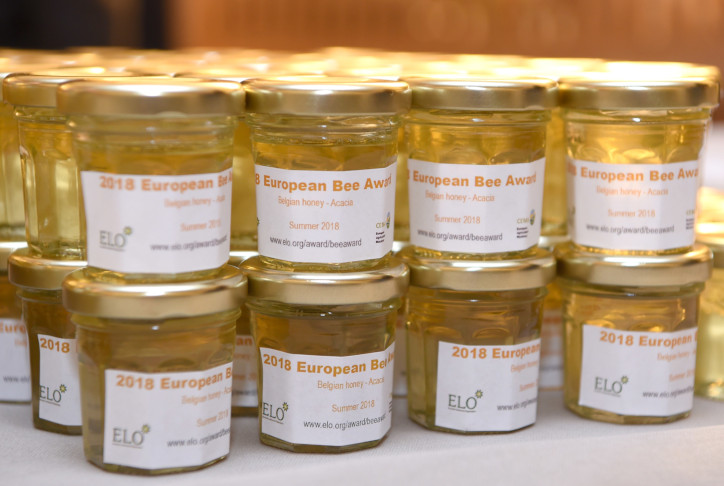
2017 EDITION
Solitary bee’s protection and bee-friends spraying technology winner projects of the IV edition of the European Bee Award
In a ceremony hosted by MEP Franc Bogovič at the European Parliament in Brussels and in presence of EU Commissioner for Digital Economy and Society Mariya Gabriel, this year’s award celebrates in particular the great commitment of private and public organisations, as well as individual initiatives, to pollinators’ wellbeing and bee-friendly farming practices in Europe.
“A bee project for solitary bees” by the Belgian material solution company Sibelco, as part as its Biodiversity and European Species protection programme, is the winner of the “Land Management Practices Award”.
In acknowledgement of innovative & practical ideas to protect pollinators in European farming, the European Bee Award, established by the European Landowners’ Organization (ELO) and the European Agricultural Machinery Industry Association (CEMA), was awarded to this year’s winners:
- “Dropleg: Application of Plant Protection Products below the flowering level in rapeseed” presented by the specialised nozzles company Lechler GmbH receives the “innovative & technological solutions” prize.
Learn more about the 2017 winners here
Moreover, a “Friend of pollinators” award has been bestowed to Mr. Marek Nowakowski for his contribution to the protection of pollinators as a private individual, and a special mention was granted to “Terras de Mondalva” for an integrated beekeeping project for rural development in Portugal.
Franc Bogovič MEP, Member of the Jury, stressed “the European Bee Award adds the necessary recognition to very valuable projects which year-on-year show there is a shared commitment to protecting pollinators in European agriculture”.
Mariya Gabriel, European Commissioner for Digital Economy and Society congratulated the initiative “Events such as the European Bee Award are very important for the promotion of the protection of bee health. It is crucial that we maintain bee-health and the interests of the beekeeping sector on the top of the political agenda, at all levels, as well as to promote initiatives and projects, which allow awareness-raising for policy-makers and citizens, and to be proactive in addressing the challenges of the beekeeping sector”.
Marleen Evenepoel, CEO of the Agency for Nature & Forests Government of Flanders, emphasized the actions undertaken in Belgium for the protection of pollinators, such as the ‘Week van de bij’ in Flanders, or the signature of the Declaration of the international Coalition of the Willing on Pollinators. Learn more about the actions clicking here.
Thierry de l’Escaille, Secretary General of ELO: “There has been fierce competition for the Prize, making it difficult to choose a winner. Yet the high number and quality of projects submitted is a great tribute to the dedicated efforts that are being made across Europe to halt bee decline and enhance biodiversity.”
On behalf of CEMA, Gilles Dryancour, Honorary President, welcomed the contribution of the farm equipment industry to develop cutting-edge spraying technology that improves in parallel farming activities and the protectionof pollinators’ populations, as showcased by the Dropleg project.
In 2017, the European Bee Award competition received 18 applications from 11 different European countries. The award ceremony brought together over 100 participants: bee-keepers, policy makers, landowners, academia and representatives of the agri-food sector, exchanging best practices and enjoying a festive networking evening celebrating bees and biodiversity.
